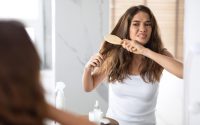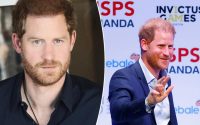Why masks make you more attractive: study
Forget Gua Sha face stones, ice rollers and lip fillers, you probably already have the simplest and most effective tool to make your face more attractive: a blue medical mask.
As the world grapples with whether or not to continue wearing a mask, a recent study might convince some to strap them on.
Wearing a mask makes you more attractive, a study published in the Cognitive Research Principles and Implications Journal found. (If only someone had told all Karen’s before their raging fits.)
Blue medical masks were associated with being the most attractive, and cloth masks were a close second still making faces “significantly more attractive,” according to researchers at Cardiff University’s School of Psychology in the UK.
“Our study suggests faces are considered most attractive when covered by medical face masks,” co-author Michael B. Lewis told The Guardian.

Female participants in the study, which was also led by Oliver Hies, viewed four photos of a man with a medical mask, a cloth mask, a book covering half his face and no covering. Medical masks came out on top, with cloth coming in close second and no covering ranking last.
The results suggested that covering the bottom half of your face in any way, whether you are hot or not, increased people’s attractiveness — showing that the results were not necessarily about hiding unattractive qualities.
The reason could be that covering the bottom half of your face brings a certain allure and sense of mystery — a surefire turn-on, as many studies and publications have claimed that 93% of communication comes from nonverbal cues, including smiling and frowning.
Masks also force attention on the eyes and hair — two of our most engaging facial features, the study noted.
Before the pandemic hit, medical face masks were mostly associated with illness, but since COVID forced everyone to wear masks for nearly two years, our thoughts about seeing people wearing masks, namely of the medical variety, in public have changed drastically.
“The results run counter to the pre-pandemic research where it was thought masks made people think about disease and the person should be avoided,” Lewis noted. “The pandemic has changed our psychology in how we perceive the wearers of masks. When we see someone wearing a mask we no longer think ‘that person has a disease, I need to stay away.’”

Blue medical masks, in particular, could be considered the most attractive because of their associations with medical professionals or the “white-coat effect” in which females find male doctors sexier when wearing a white coat.
“This may be because we’re used to healthcare workers wearing blue masks and now we associate these with people in caring or medical professions,” Lewis added. “At a time when we feel vulnerable, we may find the wearing of medical masks reassuring and so feel more positive towards the wearer.”
Masks can also “be seen as a sign of being responsible and caring citizens, which may positively impact perceived attractiveness.” Throughout the pandemic wearing masks has been seen as a sign of respect and doing one’s part to help society, which are great traits to add to your dating profile.
Lewis told The Guardian that a second study, with men rating masked women, is currently being carried out.


